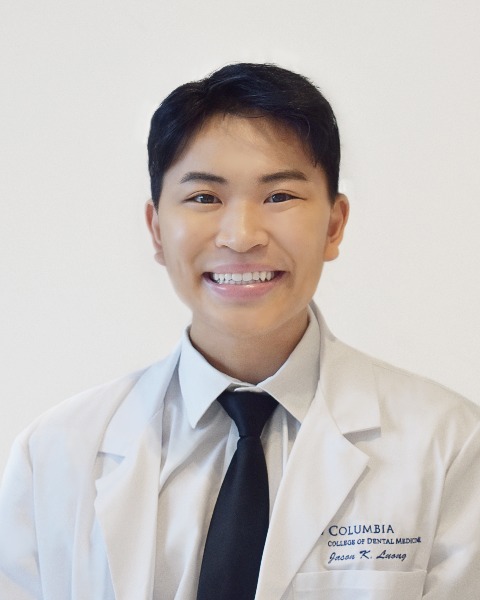Anatomy Education Posters
Poster: Anatomy Education Posters
98 - The State of Mental Health in Health Professions Students in 2023 - A Global Survey via an Anatomy Course-based Program
Sunday, March 24, 2024
5:00pm - 7:00pm US EDT
Location: Sheraton Hall
Poster Board Number: 98
There are separate poster presentation times for odd and even posters.
Odd poster #s – first hour
Even poster #s – second hour
Co-authors:
There are separate poster presentation times for odd and even posters.
Odd poster #s – first hour
Even poster #s – second hour
Co-authors:
Jasmine Prasad - King's College London; Dinesh Bhugra - King's College London; Dana Stearns - Harvard Medical School; Cecilia Brassett - University of Cambridge; Andrew Molodynski - University of Oxford; Geoffroy Noel - University of California San Diego; Anette Wu - Columbia University Vagelos College of Physicians and Surgeons

Jason Luong
Dental Student
Columbia University College of Dental Medicine
New York, New York, United States
Presenting Author(s)
Abstract Body : Introduction & Objective
In recent years, it has become well-documented that medical students are particularly susceptible to mental health problems and illness. This issue has been attributed to the high pressures of demanding curricula, as well as financial and housing concerns. The age bracket of this demographic and certain personality characteristics associated with medical students - such as maintaining high personal standards - have also been suggested as possible reasons. The latest generation of medical students is beginning their education in a post-COVID-19 world, which has also been a major contributor to stress for medical students since 2020. This study makes use of the varied international population of the International Collaboration & Exchange Program (ICEP), an anatomy course-based global networking program, to assess the mental health concerns of current health professions students.
Materials and Methods
Participants were recruited from the ICEP in the fall of 2023. An online, validated survey was distributed to 480 students to assess their sources of stress, mental health problems, burnout, and substance use. We used the Oldenburg Burnout Inventory (OLBI), the General Health Questionnaire 12 (GHQ-12), and the CAGE questionnaire, a screening test for problematic alcohol drinking.
Results
Results reveal that 3.97% of participants were diagnosed with a mental health condition while in school, and 54.60% of all participants identified academic studies as the primary source of their stress. Utilizing the OLBI, 37.90% screened positive for burnout, with 52.46% indicating disengagement and 50.32% for exhaustion. The GHQ-12 identified 20.21% of participants to be in psychological distress, and the CAGE screened 5.21% of participants positive for alcohol issues. There was no significant variation across regions for any of these scores. There was a significant positive correlation between scores on the OLBI and GHQ-12 (r = 0.457, p < 0.0001).
Conclusion
Our results show that mental health concerns are consistently high amongst students in many regions of the world. According to the OLBI, 37.90% of our sample showed signs of burnout. More than half of our sample indicated both disengagement and exhaustion, and more than half considered their academic studies their main source of stress. This is notable considering the many global regions captured in this sample.
Significance and Implication
These preliminary findings show that trends toward burnout, disengagement, and exhaustion are significant enough in this sample to warrant further attention. They lend themselves to analysis that would indicate how these themes of mental ill-health affect students by global region to identify trends and potential interventions to support the mental health of students.
In recent years, it has become well-documented that medical students are particularly susceptible to mental health problems and illness. This issue has been attributed to the high pressures of demanding curricula, as well as financial and housing concerns. The age bracket of this demographic and certain personality characteristics associated with medical students - such as maintaining high personal standards - have also been suggested as possible reasons. The latest generation of medical students is beginning their education in a post-COVID-19 world, which has also been a major contributor to stress for medical students since 2020. This study makes use of the varied international population of the International Collaboration & Exchange Program (ICEP), an anatomy course-based global networking program, to assess the mental health concerns of current health professions students.
Materials and Methods
Participants were recruited from the ICEP in the fall of 2023. An online, validated survey was distributed to 480 students to assess their sources of stress, mental health problems, burnout, and substance use. We used the Oldenburg Burnout Inventory (OLBI), the General Health Questionnaire 12 (GHQ-12), and the CAGE questionnaire, a screening test for problematic alcohol drinking.
Results
Results reveal that 3.97% of participants were diagnosed with a mental health condition while in school, and 54.60% of all participants identified academic studies as the primary source of their stress. Utilizing the OLBI, 37.90% screened positive for burnout, with 52.46% indicating disengagement and 50.32% for exhaustion. The GHQ-12 identified 20.21% of participants to be in psychological distress, and the CAGE screened 5.21% of participants positive for alcohol issues. There was no significant variation across regions for any of these scores. There was a significant positive correlation between scores on the OLBI and GHQ-12 (r = 0.457, p < 0.0001).
Conclusion
Our results show that mental health concerns are consistently high amongst students in many regions of the world. According to the OLBI, 37.90% of our sample showed signs of burnout. More than half of our sample indicated both disengagement and exhaustion, and more than half considered their academic studies their main source of stress. This is notable considering the many global regions captured in this sample.
Significance and Implication
These preliminary findings show that trends toward burnout, disengagement, and exhaustion are significant enough in this sample to warrant further attention. They lend themselves to analysis that would indicate how these themes of mental ill-health affect students by global region to identify trends and potential interventions to support the mental health of students.


